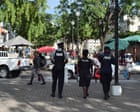
In an interconnected world, the pursuit of peace and security remains paramount, as countries continually adapt strategies to address evolving challenges. Recent developments highlight the diverse approaches being taken to ensure citizens’ safety and well-being. In Trinidad and Tobago, the government has declared a state of emergency for the second time this year, underscoring its commitment to tackle the threat posed by organized crime groups. Meanwhile, in the French city of Nîmes, local authorities have implemented a temporary curfew for minors in response to escalating gang-related activities. These measures reflect a broader global effort to maintain order and protect communities amidst complex security dynamics.
Trinidad and Tobago’s decision to enact a state of emergency is rooted in intelligence reports indicating a heightened risk from criminal syndicates. According to Police Commissioner Allister Guevarro, these groups, operating both within and beyond the nation’s prisons, have reportedly formed a coordinated network with plans to disrupt peace through assassinations, robberies, and kidnappings. This decisive step demonstrates the authorities’ resolve to preemptively address potential threats, ensuring the safety of citizens and averting further harm.
The reimposition of the state of emergency is a testament to Trinidad and Tobago’s proactive stance in crime prevention. By enabling enhanced police powers, the government aims to dismantle criminal activities at their core, restoring a sense of calm and security among the populace. Through coordinated efforts with law enforcement agencies and community stakeholders, there is a shared commitment to fostering a safer environment, where individuals can live and thrive without fear.
Simultaneously, the city of Nîmes in France has introduced a temporary curfew for minors as a direct response to a surge in criminal incidents linked to drug trafficking. This preventive measure aims to curtail youth involvement in illegal activities, while also addressing broader societal concerns related to narcotics and their impact on community safety. By restricting nighttime movements of minors, authorities seek to protect young residents from the influences of crime and guide them towards constructive alternatives.
The introduction of the curfew aligns with additional efforts by French authorities to bolster police presence and resources. By enhancing law enforcement capabilities, Nîmes aspires to not only deter crime but also inspire confidence among the public. This holistic approach underscores the importance of integrating community engagement and support systems into the framework of crime prevention, ensuring a well-rounded strategy that addresses root causes and fosters long-term stability.
Both instances emphasize a mindful commitment to safeguarding communities through tailored interventions. In Trinidad and Tobago, systematic intelligence gathering and decisive action highlight the importance of readiness and adaptability in crime prevention. Meanwhile, Nîmes’ focus on protecting its youth underscores the value of nurturing initiatives that aim to guide future generations away from the clutches of criminal influences.
Across the globe, these examples serve as reminders of the imperative to remain vigilant and collaborative in the pursuit of safety and security. By valuing resilience and embracing innovation, societies can navigate the complexities of modern security challenges with confidence and grace. As nations continue to share insights and experiences, they contribute to a collective vision of a world where peace and harmony prevail.
The evolving nature of crime necessitates an ongoing dialogue among global citizens and leaders, fostering a shared understanding of security imperatives in the 21st century. As communities unite to address common challenges, they pave the way for a secure future, embracing diversity and inclusion as cornerstones of a harmonious existence. Through mindful engagement and strategic action, the quest for safety becomes a concerted effort that honours the unique needs and aspirations of people everywhere.
Source: {link}
